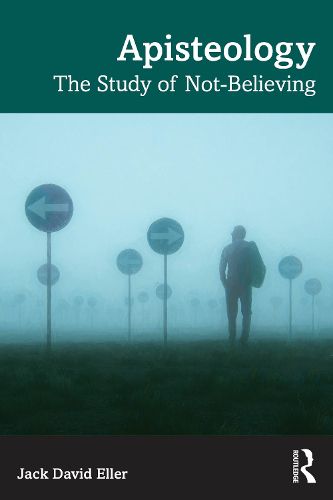Readings Newsletter
Become a Readings Member to make your shopping experience even easier.
Sign in or sign up for free!
You’re not far away from qualifying for FREE standard shipping within Australia
You’ve qualified for FREE standard shipping within Australia
The cart is loading…






This book unites the burgeoning scholarly literature on not-believing in various disciplines into a proposed new field of apisteology. It demonstrates that not-believing-like not-knowing-is a worthy and distinct subject and not merely a vacuum where belief (like knowledge) is lacking. Several contemporary issues appear repeatedly in the book, such as conspiracy theories, vaccine skepticism, climate change denial, and fake news. Each chapter begins with a vignette on one of these topics and ends with a section looking ahead to which certain disciplinary approaches to not-believing can tell us. Not only does this format allow us to consider how not-believing is pervasive and distinct, but also allows us to consider what apisteology as a distinct field of study brings to the table. Ultimately, the book's consistent appeals to the constructed quality of not-believing, to the trust and commitment dimensions of not-believing, and ultimately to the critique of "truth" as the central or only interest in "belief" make it key reading for scholars and students across the social sciences and humanities.
$9.00 standard shipping within Australia
FREE standard shipping within Australia for orders over $100.00
Express & International shipping calculated at checkout
This book unites the burgeoning scholarly literature on not-believing in various disciplines into a proposed new field of apisteology. It demonstrates that not-believing-like not-knowing-is a worthy and distinct subject and not merely a vacuum where belief (like knowledge) is lacking. Several contemporary issues appear repeatedly in the book, such as conspiracy theories, vaccine skepticism, climate change denial, and fake news. Each chapter begins with a vignette on one of these topics and ends with a section looking ahead to which certain disciplinary approaches to not-believing can tell us. Not only does this format allow us to consider how not-believing is pervasive and distinct, but also allows us to consider what apisteology as a distinct field of study brings to the table. Ultimately, the book's consistent appeals to the constructed quality of not-believing, to the trust and commitment dimensions of not-believing, and ultimately to the critique of "truth" as the central or only interest in "belief" make it key reading for scholars and students across the social sciences and humanities.